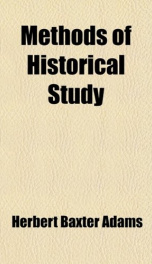methods of historical study

Purchase of this book includes free trial access to www.million-books.com where you can read more than a million books for free. This is an OCR edition with typos. Excerpt from book: I. Special Methods Of Historical Study' AS PTTBSUED AT THE JOHNS HOPKINS UNIVERSITY AND AT SMITH COLLEGE. The main principle of historical training at the Johns Hopkins University is to encourage independent thought and research. Little heed is given to text-books, or the mere phraseology of history, but all stress is laid upon clear and original statements of fact and opinion, whether the student's own or the opinion of a consulted author. The comparative method of reading and study is followed by means of assigning to individual members of the class separate topics, with references to various standard works. These topics are duly reported upon by the appointees, either ex tempore, with the aid of a few notes, or in formal papers, which are discussedat length by the class. The oral method has been found to afford a better opportunity than essays for question and discussion, and it is in itself a good means of individual training, for the student thereby learns to think more of substance than of form. Where essays are written, more time is usually expended on style than on the acquisition of facts. If the student has a well-arranged brief, like a lawyer's, and a head full of ideas, he will express himself at least intelligibly, and clearness and elegance will come with sufficient practice. The ex tempore method, with a good brief or abstract (which may be dictated to the class) is one of the best methods for the teacher as well as for the student. The idea should be, in both cases, to personify historical science in the individual who is speaking upon a given topic. A book or an essay, however symmetrical it may be, is often only a fossil, a lifeless thing; but a student or teacher talking from a clear head is a fountain of living science. A class of bright minds quickly...
Info about the book
Author:
Series:
Unknown
ASIN:
B002T9E7N6
Rating:
4/5 (4)Your rating:
0/5
Languge:
English
Users who have this book
Users who want this book
What readers are saying
What do you think? Write your own comment on this book!
write a commentif you like methods of historical study try:
Other books by this author
Do you want to read a book that interests you? It’s EASY!
Create an account and send a request for reading to other users on the Webpage of the book!


